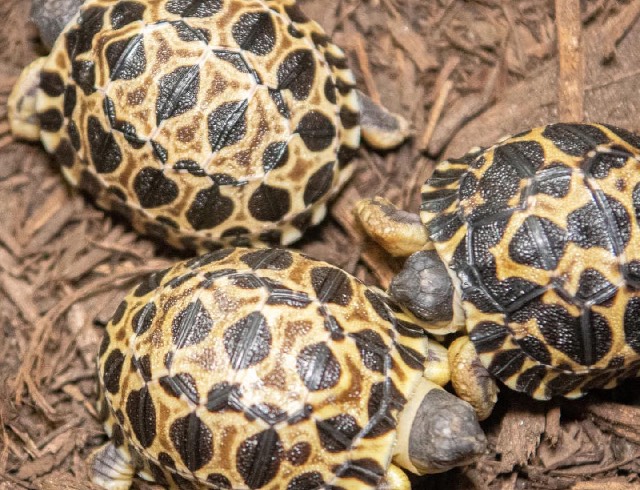The oldest animal at the Houston Zoo is officially a first-time father. Mr. Pickles, a 90-year-old radiated tortoise, and his partner, 53-year-old Mrs. Pickles, have welcomed three baby tortoises into the world. The hatchlings were actually quite a surprise since their eggs were unexpectedly discovered by a hepatology keeper.
But the birth of the “Baby Pickles” is actually a really big “dill” for their critically endangered species.

They say slow and steady wins the race. Well, these long-time lovebirds sure did take their time in starting a family. Mr. Pickles has been at the Houston Zoo since 1987 and has been paired up with Mrs. Pickles since she arrived in 1996. So Mr. and Mrs. Pickles have been bonded for 27 years! And only now have they had their first hatchlings together.
The eggs hatched on different days in February, and the tiny new tortoises have been named Dill, Gherkin, and Jalapeño. (Staying true to the pickle theme.) You can tell them apart by the distinguishable markings on their shells. Jalapeño has the darkest shell, and Gherkin has a white dot in the center.
They will remain behind the scenes in the Reptile & Amphibian House until they are old enough to safely join their parents.
Keeper Stumbled Upon The Surprise
The tortoises having hatchlings was actually quite a surprise to the staff at the zoo. It was just before closing time one evening in October when a herpetology keeper happened upon Mrs. Pickles while she was in the process of laying her eggs.
But since the soil in Houston isn’t hospitable to the hatching of tortoises that are native to Madagascar, the animal care team quickly went to work uncovering the eggs and got them to the safety of the Reptile & Amphibian House. It’s extremely unlikely that the eggs would have hatched if they were not found, so it was incredibly lucky that the keeper had been in exactly the right place at exactly the right time.

Radiated tortoises are critically endangered due to targeting by the illegal pet trade and are known to produce very few offspring, so the hatchlings are a very big deal, indeed!
Not only that, but the DNA their dad offers the species is especially valuable.
“These little Pickles are a big dill for radiated tortoise genetics as their father is the most genetically valuable radiated tortoise in The Association of Zoos and Aquariums’ (AZA) Species Survival Plan (SSP),” said the zoo.
Radiated tortoises can live for up to 150 years, but exactly how long they can reproduce is unknown.
Featured Image: Facebook
